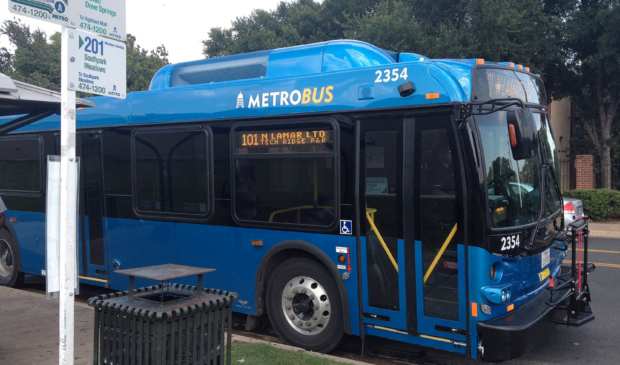Newsletter Signup
The Austin Monitor thanks its sponsors. Become one.
Most Popular Stories
- Texas Attorney General Ken Paxton sues nonprofit that serves homeless in South Austin
- Austin opens new affordable housing development in Southeast Austin
- City-owned Austin Studios found to have generated $2.6B in economic impact
- Austin Energy proposes gas peaker units, not larger combined cycle plant
- I-35 caps plan reconsidered as cost estimates soar by 61%
-
Discover News By District

Cap Metro struggles to recruit and retain more bus operators
Friday, August 19, 2022 by Samuel Stark
Late last year, Capital Metropolitan Transportation Authority raised the starting hourly wage for bus drivers to $22/hour and kicked in a $5,000 signing bonus for qualified candidates with a commercial driver’s license. But despite these perks, the transit organization is having trouble hiring enough bus drivers to fill all available positions.
“Generally, we’re gaining about 10 to 13 operators per month. We really need to be gaining about 15 to 20,” Chief Operating Officer Andrew Skabowski said at Capital Metro’s monthly operations meeting on Monday.
Skabowski told the Austin Monitor that morale issues, challenging driving schedules and salaries are generally the reasons Capital Metro has trouble recruiting and retaining bus operators.
“Pre-pandemic, you walked into a break room and people were playing dominoes and you had a pool table,” he said. “People ate and they joked around …. It was a very family atmosphere,” he said.
Then the pandemic hit. Capital Metro needed to rework the schedule to limit the number of people in the break room, and the pool table was removed. But now that Covid-19 cases are more under control, Capital Metro is working on “trying to get a little bit back to that family atmosphere,” Skabowski said. They’re also planning on bringing back the pool table.
New drivers generally get the less desirable schedules, Skabowski said, which makes some people realize they are not cut out for the job. However, with seniority comes access to more favorable working hours.
Though Capital Metro has hiked up its starting wages, other industries in Austin offer more competitive salaries that Skabowski feels lure some candidates away from joining Capital Metro. “I think $22 is a competitive salary. But Austin’s a competitive city,” he noted.
However, in Skabowski’s opinion, it’s not all about money. Driving a bus allows a person to serve the public and interact with people in the community.
“It’s a great job, and you’re (going to) meet and engage a lot of people every day,” he said.
Despite not being able to hire as many drivers as the agency would like, Capital Metro service is improving. Capital Metro calculates a figure called “lost time” – the amount of service lost from the bus not showing up on time or at all. In January, about 15 percent of its service was considered lost time. The agency has reduced the proportion to slightly under 3 percent in July and strives to bring the number down to 1 percent.
To learn more about drivers’ job satisfaction and how to attract more talent, Capital Metro has hired the Texas A&M Transportation Institute to do a public outreach effort. The results of this effort will be presented at a board meeting toward the end of the year.
Photo made available through a Creative Commons license.
The Austin Monitor’s work is made possible by donations from the community. Though our reporting covers donors from time to time, we are careful to keep business and editorial efforts separate while maintaining transparency. A complete list of donors is available here, and our code of ethics is explained here.
You're a community leader
And we’re honored you look to us for serious, in-depth news. You know a strong community needs local and dedicated watchdog reporting. We’re here for you and that won’t change. Now will you take the powerful next step and support our nonprofit news organization?








